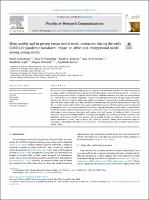Please use this identifier to cite or link to this item:
https://hdl.handle.net/20.500.12202/9647| Title: | Sleep quality and in-person versus online social interaction during the early COVID-19 pandemic lockdown: Impact on affect and interpersonal needs among young adults |
| Authors: | Zuckerman, Emily Fernandes, Sara N. Sullivan, Sarah R. Ortin-Peralta, Ana Jeglic, Elizabeth Miranda, Regina Baroni, Argelinda 0000-0003-0825-6003 |
| Keywords: | Sleep quality Social media Affect Perceived burdensomeness Thwarted belongingness |
| Issue Date: | Sep-2023 |
| Publisher: | Elsevier B.V. |
| Citation: | Zuckerman, E., Fernandes, S. N., Sullivan, S. R., Ortin-Peralta, A., Jeglic, E., Miranda, R., & Baroni, A. (2023). Sleep quality and in-person versus online social interaction during the early COVID-19 pandemic lockdown: Impact on affect and interpersonal needs among young adults. Psychiatry Research Communications, 3(3). https://doi.org/10.1016/j.psycom.2023.100134 |
| Series/Report no.: | Psychiatry Research Communications;3(3) |
| Abstract: | Abstract We examined relationships among sleep quality and forms of social interaction (in-person vs. online) as predictors of change in affect and interpersonal needs (perceived burdensomeness, thwarted belongingness) – correlates of suicidal thoughts and behaviors – during the early COVID-19 pandemic lockdown. New York City undergraduates (N = 58) from four public colleges completed a baseline survey and daily diaries up to 30 days in April-June 2020. Adjusting for relevant covariates, better sleep quality and in-person communication predicted greater positive affect and lower negative affect over time, but online social interaction only predicted greater positive affect and did not predict negative affect. Better sleep quality predicted lower perceived burdensomeness but not thwarted belongingness. Both in-person and online social interaction – but not total hours on social media – predicted lower thwarted belonging and perceived burdensomeness. Greater hours spent on social media each day lessened the relationship between in-person interaction and positive affect and lessened the buffering effect of in-person interaction on perceived burdensomeness. Improving sleep quality and increasing in-person interaction may ameliorate psychological variables that increase risk for suicidal thoughts and behaviors. However, when in-person interaction is limited, such as during the COVID-19 pandemic, online social interaction might be encouraged – depending on the nature of the interactions – to increase positive affect and buffer against suicide-related factors. |
| Description: | Scholarly article / Open access |
| URI: | https://hdl.handle.net/20.500.12202/9647 |
| ISSN: | 2772-5987 |
| Appears in Collections: | Ferkauf Graduate School of Psychology: Faculty Publications |
Files in This Item:
| File | Description | Size | Format | |
|---|---|---|---|---|
| Ortin OA 2023 Sleep quality nihms937987.pdf | 272.83 kB | Adobe PDF |  View/Open |
This item is licensed under a Creative Commons License

